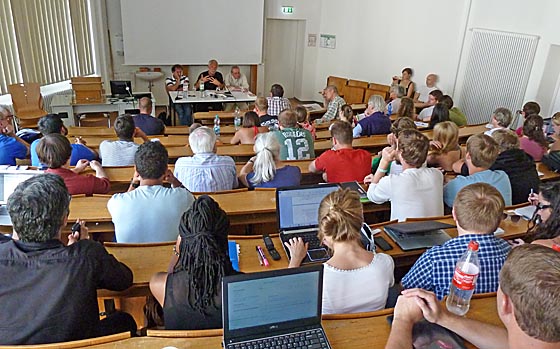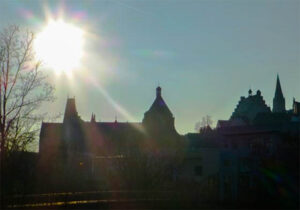Round Table ‚Change in the Arab World: New beginning or status quo?‘

 Marburg 24.8.2012 (red) On August 14 – 2012 international Students from nine Countries could hear a Talk routed and conducted inside of the International Summer University (ISU) of the Philipps-University at Marburg by Johannes Maria Becker, scientific director of the ISU. The Online-Magazine das Marburger. presents this Talk to all interested users:
Marburg 24.8.2012 (red) On August 14 – 2012 international Students from nine Countries could hear a Talk routed and conducted inside of the International Summer University (ISU) of the Philipps-University at Marburg by Johannes Maria Becker, scientific director of the ISU. The Online-Magazine das Marburger. presents this Talk to all interested users:
Johannes Maria Becker: What was – according to you analysis – the catalyst for the Arab Spring? Why did the uprising begin in Tunisia and Egypt?
Werner Ruf: The catalyst was, for sure, the social situation. Social unrest, protest against working conditions and life without any perspectives had taken place since years before the general upheaval. Just think about the thousands of people who tried to cross the Mediterranean knowing very well that they were risking their lives.
Rachid Ouaissa: There is no single reason for the developments in Tunisia and Egypt. Nevertheless, historical processes have paved the way for the current uprisings in these countries. Since the implementation of neoliberalism in this region, the Arab states have no societal projects any more. The rulers have no big visions for the whole society. They have only one goal: to secure their power.
Since the mid-1980s we have a kind of delegitimation process in the Arab World. Two pillars of the system have fallen into crisis: The distribution system based on rents, and the ideological crises with the failure of great ideologies like the Arab socialism and Pan-Arabism. The wealth of these countries is increasingly concentrated in the hands of a minority. The middle class (intellectuals, unemployed graduates etc.) has no perspectives. Social inequality is higher than ever before.
Furthermore, the neoliberal course since the early 1990s caused big structural and demographical changes in the Arab society. These developments have diminished the size of the Arab family as well as the importance of social hierarchies. Young people want to participate in political, social, cultural and economic live. The French demographer Emmanuel Todd believes that this change is unstoppable and therefore calls it a silent revolution.
Johannes Maria Becker: Are there any bridges/connections between the Arab Spring and the world wide movement against neoliberalism, concentrated in/represented by ATTAC and – currently – the ‘Occupy’-Movement?
Werner Ruf: Yes, definitely. The situation of the youth is the same in North Africa as in Greece and in Spain where the young generation has no social perspective. This is as well true for Israel where similar protests against the consequences of neoliberal politics took place.
Rachid Ouaissa: There are indeed connections. I believe that especially we (scientists and journalists) should stop seeing the world as a group of separate islands. Even Wallerstein gave evidence for the impact of the center on the periphery. The mass protests in the Arab World in the 1980s, occurred at the same time as the youth protests in other parts of the world. The reason for these protests was the crisis of Keynesianism as economic model. Today we face a crisis of neoliberalism. The Europeans are trying to resolve it by cosmetic reforms. That may lead to a crisis of capitalism which will imply serious consequences for humanity as a whole.
Johannes Maria Becker: What role did religion on the one hand and the social context on the other hand play inthe Arab Apring?
Rachid Ouaissa: I think the social circumstances played a major role. Anthropological studies on the Arab World have shown that one of the main constants of Arab society is the belief in human equality. By the way, there are many similarities to the American society (Alexis de Tocqueville). This explains the strong religiosity in both societies. With the rise of inequality we do have the rise of religion, as replacement/substitue to the failed state. However, the self-immolation of the Tunisian street vendor Mohamed Bouazizi is a non religious act and at the same time an act of protest against the religious authorities. We have never seen any religious symbols at the demonstrations in Cairo, Tunis and other Middle Eastern cities.
Werner Ruf: At the beginning religion did not play any role, and the islamist parties have been absent at the beginning of the protest. But they gained more and more influence because their members had been the victims of the repression of the old regimes, because they stood for more social justice and were seen as the genuine opposition to the old, corrupt and pro-western dictatorships.
Johannes Maria Becker: War against Libya: was it part of the Arab Spring?
Werner Ruf: Yes and no. The opposition against Qadhafi’s dictatorship was real, but there were no social problems in Libya: the relatively small population got a good part of the oil rent. It was rather the old rivalry between the eastern and western tribes of the country as well as Qadhafi’s shrinking power privileging some of the Tripolitanian tribes as his last resort. And: From the very beginning the Libyan opposition started an armed struggle against the regime in power while the protest in Tunisia an Egypt remained non-violent. The Libyan opposition received strong foreign support from the start of the uprising, especially from the states of the Gulf Cooperation Council led by Saudi-Arabia and Qatar.
Rachid Ouaissa: Libya is a problematic case. This country has no real economic problems for itslow population density. Two aspects are of relevance: First, the unequal distribution of power among the tribes and second, the efforts of the Wes to dominate the natural resources of this rich country. The intervention in Libya is an excellent example for a new kind of imperialism, which I would call turbo-imperialism. Recent events have shown that the European powers are ready to carry out a military intervention to protect their own interests. Libya’s problem is its geographical location in the immediate periphery of Europe.
Johannes Maria Becker: The actual riots in Syria: are they inspired by the Arab Apring?
Rachid Ouaissa: Yes, the riots are obviously a result of the Arab spring. But in Syria we are dealing with a relative homogeneous ruling class, which is difficult to divide. The West would have been better advised to intervene in Syria, not in Libya, if it is really interested in democracy for the Arab World or the protection of human rights. But of course, Syria is geostrategically not as isolated as Libya. Syria has a very heterogeneous society with Israel and a very instable Lebanon in the neighborhood and strong influence of Iran.
Werner Ruf: Definitely yes: The regime of Assad is a terrible dictatorship. And since the liberal economic “opening” – which started in 2005 – the social conditions for the masses became unbearable. But then the conflict was systematically internationalized.
Johannes Maria Becker: What is the role of foreign countries in the Arab Spring?
Werner Ruf: Saudi-Arabia and Qatar from the very beginning started to arm the opposition and to introduce islamist djihadist fighter groups from Iraq an Libya. The Qatari TV-Station organized anti-Assad propaganda like in Libya. Syria is – besides Algeria and Lebanon – the last important secular state in the region. Its sheer existence is a provocation for the fundamentalist legitimization of the despotic regimes of the Arabian Peninsula. The fall of the Assad regime would prepare the way to the overtaking of power of islamist regimes in the whole region – supported by the Turkish government.
At the same time a regime change in Syria would weaken Iran fundamentally/considerably which would – in return – loose its only important ally. This explains the western support for this strategy which aims at weakening and isolating Iran in order to build a new axis against Teheran, based on the common interests of Saudi-Arabia and Israel.
Rachid Ouaissa: Previous to the Arab Spring the international system as such played a role, but not one specific country. The Arab regimes were not able to solve social problems such as the many food crises (we had more than 5,000 strikes in Egypt a year before the riots). These regimes were considered to be accomplices of the West in the war against terrorism, such as in the war in Iraq or the Israel-Palestine conflict. Nevertheless, the role of the new media, internet, Wikileaks affair, etc. should not be underestimated.
I argue that the Syrian case gives evidence that the events in the Arab world are part of a conflict over the new mapping of the Middle East. The current situation has a lot in common with the situation after World War I. The only difference is that today there are more competing players than after the war. Today, the main players are the old powers (USA and Europe), the newly emerging powers (Russia and China), the Islamic states that are trying to implement their Islamic models in the Arab countries (Iran and Turkey) and the two new Arab powers, Qatar and Saudi Arabia .
Johannes Maria Becker: What might be further developments in the Arab Spring? Might it inspire the developing countries so that it becomes a global spring?
Werner Ruf: On the one hand – yes: This is an upheaval of the young generations without any social perspectives. Similar movements have taken place in Black Africa too.
On the other hand it becomes clear that the islamisation under wahhabite leadership aims at establishing reactionary regimes friendly to the West: The Islamists are the only political force which sustains fundamentally the principles of liberal economy and guarantees the free flow of oil to the West.
Rachid Ouaissa: The development in the Arab World and the future of democracy depends on two important factors: First, it depends on the kind of alliances (at society as well as state level) that can be realized by the Islamist parties. My argument is that they will only succeed if they are able to establish alliances outside of the Islamist spectrum and to deal with the major social problems such as economic slowdown, unemployment etc.. Second, it depends on the willingness of the West to accept these new leaders in the Arab World as equal partners.










